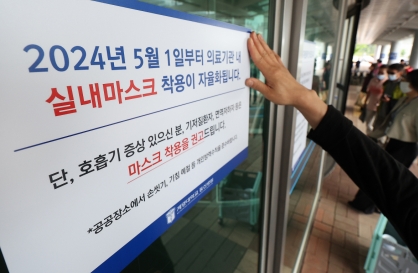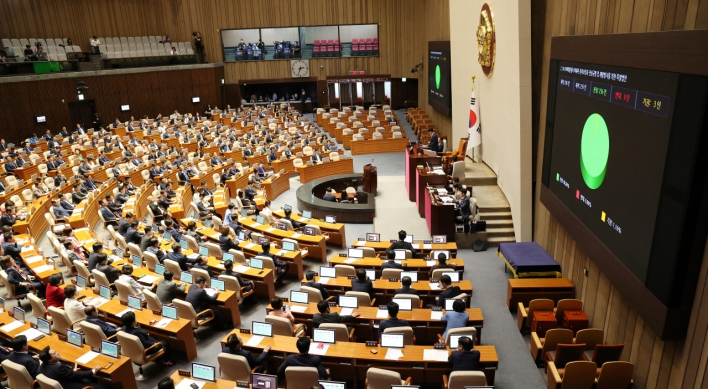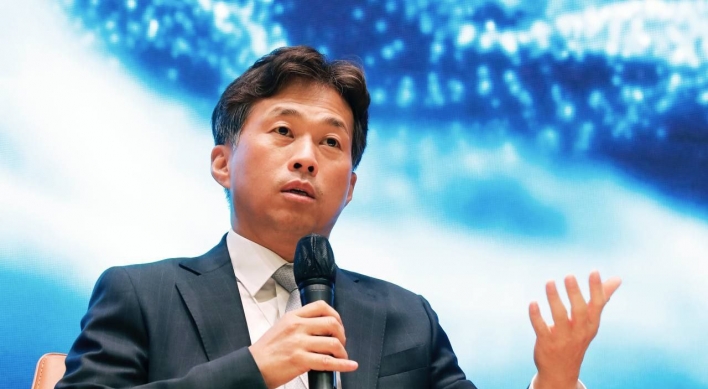A controversial nominee for the top post at the Constitutional Court on Sunday confessed to falsely registering his home address in a real estate transaction two decades ago in violation of the law.
Lee Dong-heub, who was nominated by President Lee Myung-bak earlier this month to head the top court, made the unusual confession, but insisted that the false address registration was intended not to disturb the education of his children. Lee has been suspected of committing the illegality to avoid transfer tax for his apartment bought in Bundang, south of Seoul, in 1992.
Lee Dong-heub, who was nominated by President Lee Myung-bak earlier this month to head the top court, made the unusual confession, but insisted that the false address registration was intended not to disturb the education of his children. Lee has been suspected of committing the illegality to avoid transfer tax for his apartment bought in Bundang, south of Seoul, in 1992.

Following the nomination of Lee, who previously served on the top court from 2006-2012, opposition lawmakers have claimed he is unfit for the job citing allegations regarding his increased assets, suspected embezzlement on overseas business trips, and a political donation.
While admitting to the relatively minor illegality, Lee strongly refuted all other alleged ethical lapses.
In a written statement sent to the parliament for the two-day confirmation hearing that begins Monday, the 62-year-old nominee admitted he bought a house in Bundang, south of Seoul, in 1992 but didn’t immediately move there because his children were attending high schools in the capital city. The delayed address change was not intended to evade transfer income tax, he said.
Many Cabinet minister nominees during past confirmation hearings were accused of having registered false residential addresses for the purpose of sending their children to prestigious schools or for real-estate speculation.
Lee said it is “groundless” that he instructed court officials to get free electrical devices from Samsung Electronics Co. for giveaways at a year-end party in 2005 while he was heading the Suwon District Court.
Although the judge admitted his wife accompanied him on three overseas trips for official duties, Lee said he paid for her airline tickets and accommodations with personal money.
“Judges have been customarily allowed to bring their spouse during an official overseas business trip,” he said.
He also apologized for making a small donation to a ruling party lawmaker in 2007, saying he donated 100,000 won ($94) just once for his friend who had attended the same university.
“Although I didn’t review its legality at the time, I regret causing misunderstanding over the political neutrality of a Constitutional Court judge,” he said.
The National Assembly doesn’t have the right to reject the nomination, but some ruling party lawmakers worry whether the nationally televised confirmation hearing would spread negative sentiment over the selection, which is known to have been made under a tacit agreement with the incoming government of Park Geun-hye.
The Constitutional Court is composed of nine justices who have six year terms, three of whom are appointed from nominees selected by the National Assembly.
Lee is the first former Constitutional Court justice to be nominated to lead the court since it was established in 1988. (Yonhap News)
-
Articles by Korea Herald




![[Music in drama] Rekindle a love that slipped through your fingers](http://res.heraldm.com/phpwas/restmb_idxmake.php?idx=644&simg=/content/image/2024/05/01/20240501050484_0.jpg&u=20240501151646)

![[New faces of Assembly] Architect behind ‘audacious initiative’ believes in denuclearized North Korea](http://res.heraldm.com/phpwas/restmb_idxmake.php?idx=644&simg=/content/image/2024/05/01/20240501050627_0.jpg&u=20240502093000)


![[KH Explains] Will alternative trading platform shake up Korean stock market?](http://res.heraldm.com/phpwas/restmb_idxmake.php?idx=644&simg=/content/image/2024/05/01/20240501050557_0.jpg&u=20240501161906)









